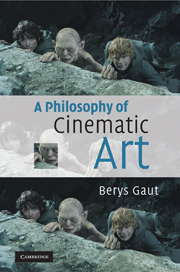7 - The role of the medium
Published online by Cambridge University Press: 01 March 2010
Summary
At many points in this book I have invoked the notions of medium-specificity and of a medium; and the notion has structured our discussion of many of the artistic features of cinema. It is now time to examine these notions in greater detail and defend them from their critics. Medium-specificity is a concept that has figured in the discussion of many art forms besides cinema, and it helps to defend its application to film if we draw on examples from other media, to show that its use in cinema is not a mere product of the idiosyncrasies of the history of film theory. So this final chapter will range more widely than a discussion of cinema and deploy examples of how medium-specificity applies in other art forms too.
I begin by briefly examining some of the historical background to medium-specificity claims, particularly in the work of Gotthold Lessing. The second section distinguishes between three different versions of the medium-specificity claim. It also discusses and defends the notion of a medium and of differential properties, expanding on the brief discussion of these notions in earlier chapters of the book. The next three sections argue for the three versions of the medium-specificity claims, relating them back to the discussion in earlier chapters of the book. I conclude with a brief summary of the main claims of the book, highlighting how cinematic art is grounded on the features of the cinematic medium.
- Type
- Chapter
- Information
- A Philosophy of Cinematic Art , pp. 282 - 307Publisher: Cambridge University PressPrint publication year: 2010



